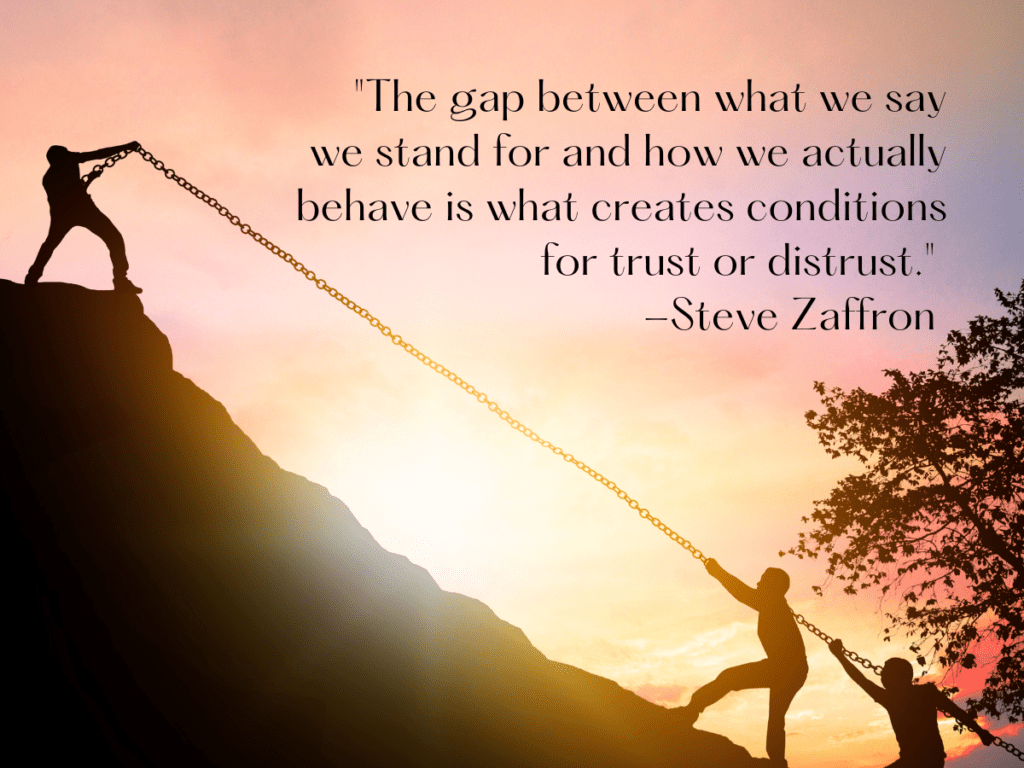Our firms value we will look at this month is integrity. Integrity provides powerful access to increased performance. Webster’s dictionary, defines integrity as “a state or condition of being whole, complete, unbroken, unimpaired, sound, perfect condition.” To create a life of integrity, it starts with mindful living. It’s not about perfection, but being authentic to our values and beliefs. Once we become aware of the gap, we can start making changes to close it. Integrity is a concept that can seem slippery and difficult to put into practice, but it’s as simple as being a person of your word and honoring your word. Practicing integrity creates trust between people since they know that others will always act with sincerity, honesty, and honor.

In everyday life, showing integrity can be as simple as keeping a promise to a friend, standing up against bullying and injustice (which is what we do in our American Dream Experiences and through our ongoing coaching), or simply owning up to a mistake. Integrity isn’t always easy to live out in an ever-changing world full of grey areas and temptations that lead us astray. Zaffron says, “Oversimplifying somewhat, ‘honoring your word’, as we define it, means you either keep your word, or as soon as you know that you will not, you say that you will not be keeping your word to those who were counting on your word and clean up any mess you caused by not keeping your word. By ‘keeping your word’ we mean doing what you said you would do and by the time you said you would do it.”
This is the integrity we value. Transparency plays an important role — being open and honest with ourselves and those around us helps build trust which leads to greater accountability for our actions and “honoring your word.” Taking on opportunities for self-reflection allows us to assess where we currently stand when it comes to practicing integrity and if anything needs improvement or further consideration before taking action.
All in all, practicing integrity is key for building meaningful relationships between. When we are people who honor our word as Steven Zaffron has laid it out, then life works. Think of it this way:
My son in law has a love for older cars. Over the years he’s owned two VW bugs from the 70’s and a 1987 Dodge RAM Charger. Each of these cars performed long enough to get him home. When they would sit in the garage, he noticed some fluid leaking from underneath the cars. With the VW’s it was a faulty gas line, and some issues with the carburetor. Both very important parts to have the car run with integrity. When the carburetor doesn’t work or is not tuned correctly, the car doesn’t start. My son in law replaced his and had help from my grandsons. They lost a screw. The entire car was worthless until the screw was found. It was out of integrity. It just didn’t work. Don’t worry, they eventually found the screw!
When it comes to integrity, our team has this mindset of “workability” when it comes to projects, reviewing workflow, and the overall business in general. We ask ourselves and each other, “Does this work?” And it comes from a stance, not of judgment, or shaming or condemning, but simply workability. We use this phrase to determine if we’re in integrity. It’s a phrase that we all understand has a deeper meaning and allows us to look at areas we have been not honoring our word. Are we perfect at it? No. Does it take some of the emotion out given situations, especially stress filled ones? Yes. Of course, there can be frustration (we’re still human), but by honoring our word and looking where we were out of integrity allows us to not place blame on others or ourselves and work more cohesively as one unit.
Understanding why honoring your word matters so much can help motivate us to embody it in every aspect of our lives – from simple day-to-day interactions all the way up through challenging situations – for lasting peace of mind and meaningful connections with those around us!
Each of our team members have read the paper Steve Zaffron wrote and agreed to uphold this type of integrity.
You can find the article here.
This web site is designed for general information only. The information presented at this site is not, nor is it intended to be, legal advice. Your use of this site does not create an attorney-client relationship. You should consult an attorney for advice regarding your individual situation. We invite you to contact us and welcome your calls, letters and electronic mail. However, contacting us does not create an attorney-client relationship. Please do not send any confidential information to us until such time as an attorney-client relationship has been established.